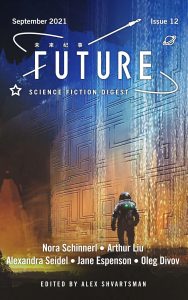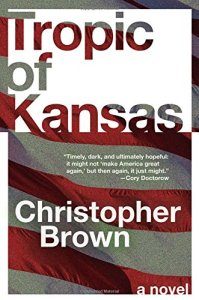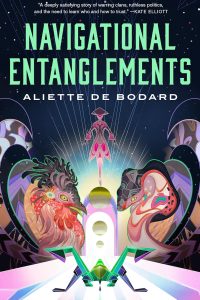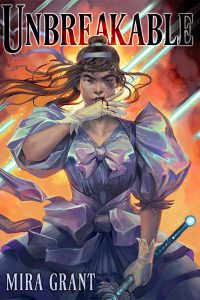Karen Burnham Reviews Short Fiction: Beneath Ceaseless Skies, Future Science Fiction, Lightspeed, and Tor.com
 Beneath Ceaseless Skies 10/21, 11/4, 11/18/21
Beneath Ceaseless Skies 10/21, 11/4, 11/18/21
Future Science Fiction Digest 9/21
Lightspeed 12/21
Tor.com 11/10/21
Chris Willrich returns to the pages of Beneath Ceaseless Skies in issue #341 with “A Manslaughter of Crows”, a new story about Shadowdrop the cat. This long story brings Shadowdrop’s city to an election period, with all sorts of shenanigans being perpetrated, some of which require our feline hero to team up with creatures as diverse as humans from several lands, mages, birds, and even a dog. This is a fun adventure with some Pratchett-esque commentary on politics. Willrich’s story is paired with “The Last Days of Summer in the City of Olives” by Filip Hajdar Drnovšek Zorko. Luzetia is a professor and surgeon, but also a long way from her home where she was the twin sister to a queen who has since become tyrannical. A duke from her home country comes to ask her to lead a rebellion against her sister, and she must find some way to decline without turning a blind eye to the plight of her countryfolk and their increasing refugee situation. The solution she works out with a colleague is an elegant one.
In the next issue, #342, I particularly liked “The Black Rainbow” by Denzel Xavier Scott. The narrator was raised in an orphanage where she passed as a strange nexian girl, but it turns out she’s something very different. We meet her fleeing the orphanage after draining the life force of everyone there, even though she loved them, and setting it on fire. We learn about her birth and how she wound up at this point, but can she resolve her conflicted nature? Eloquent monsters are the best kind. Then in issue #343 we have “Deep in the Gardener’s Barrow” by Tobi Ogundiran. Iná is running through the forest with her little brother to escape raiders who came to her village after her mother left them. But the forest itself is luring her on for its own purposes, something possibly related to her mother’s absence. This forest has very different motivations than some of the more Anthropocene-focused fantasy I’ve read of late.
Future SF Digest put out its 12th issue, continuing to bring international voices to our attention. Each of the stories here has a solid core and a charming mien. “Old People’s Folly” by Nora Schinnerl centers on a curmudgeonly old woman, Setti, with chronic pain in a post-climate catastrophe future. She finds a disk with a still-functional personality upload from pre-Flood days, named Jasmin. Despite being a digital ghost, Jasmin goads Setti towards a kinder mindset. Setti’s irascible voice anchors the story. “When a Sleeping Seed Blooms” by Alexandra Seidel is another science fictional ghost story, with a solo archaeologist exploring catacombs on an abandoned planet. Often working at the limit of her life support, she is excavating an exquisite fresco when she encounters a shadowy but kindly figure that seems to be leading her towards a new chamber. The secrets within may unlock the unknown history of the fall of an ancient empire, but tombs with ghosts aren’t always benign.
Jane Espenson of Buffy the Vampire Slayer fame (along with many, many more TV credits) has a rare stand-alone story in this issue, “Nobel Prize Speech Draft of Paul Winterhoeven, with Personal Notes”. The titular inventor is convinced that his pain is uniquely horrible and that if others could only feel the depths of his agony, they’d all understand why he’s so tortured. He develops a Pain Gun to inject his pain into others, but his then-girlfriend and nurse Belinda uses it to enable better empathy in medical practice – when doctors can actually feel the pain of their patients they can short-circuit the all-too-common “it’s not really that bad” and “it’s all in your head” responses and come up with effective treatments much faster. In the meantime, Paul’s use of the gun reveals to everyone but himself that his pain isn’t actually that much worse than anyone else’s, and his draft Nobel prize speech, never to be delivered, plumbs the depths of his bitterness about it. Even filtered through a decidedly misanthropic narrator, what would a world of true empathy look like? This story has a great voice and is just the right length for the concept. Oleg Divov’s “When the Mujna Begins” (translated by Alex Shvartsman) has an absurdist concept as Russians are each offered a remote that will let them vote for or against the “mujna.” Debates ensue, even though no one seems to know what the mujna is or even how the remotes could work. While I usually take issue with stories that end at an inflection point, in this one the run up to the moment is truly the point.
In the December issue of Lightspeed my favorite science fiction story is “Top Ten Things to See Before the World Burns” by Aimee Ogden. I have a fondness for listicle stories, and this one does a better job than average of illuminating a character. Mer is visiting Earth before it’s completely uninhabitable, something he can relate to as the survivor of the Euphrosyne asteroid habitat that failed. He’s in a liminal, transitional state, and through the touristy introductions to each vignette we also get a capsule history of what the Earth has been through to this point. It’s a story that does several things deftly in a compact format. On the fantasy side “Writing You” by Sharang Biswas also has a character navigating a time of change and grief, in this case because the narrator and their partner Achmat are mourning the loss of the other partner of their triad. In this lyrical flash piece, they muse on the stages that go into preserving their lover’s body into a book of their life, a beautiful macabre image. On a lighter note Carrie Vaughn brings us “Entanglement, or How I Failed to Knit a Sweater for My Boyfriend”. Here the narrator is a woman knitter dating a literal angel. She sets out to knit him a sweater, trying to take his wings into account, but the project goes wrong in more than the usual ways, bringing other terrestrial angels out of the woodwork. The frustrations and insecurities of both knitting and relationships are made manifest in this rather charming tale.
In November Sarah Pinsker has an oddly sweet story in Tor.com, “A Better Way of Saying”. Set in the early 20th century in a Jewish neighborhood in New York, the narrator is a young man who was hired to shout the lines of silent movies to an audience that mostly can’t read the English title cards. As he is saying these things over and over, he is thinking of ways he could improve them, and that eventually leads him to try his hand at a career in journalism. He gets a big break when Douglas Fairbanks comes to town to promote the Robin Hood movie, but an archery stunt looks like it could go horribly wrong. There’s just a tiny touch of magic here, a bit of a nudge in an otherwise modest life that makes at least one thing better in the world. This might be the least dramatic secret history I’ve read, but that makes it all the more satisfying.
Recommended Stories
“Nobel Prize Speech Draft of Paul Winterhoeven, with Personal Notes”, Jane Espenson (Future SF Digest 9/21)
“Top Ten Things to See Before the World Burns”, Aimee Ogden (Lightspeed 12/21)
“A Better Way of Saying”, Sarah Pinsker (Tor.com 11/10/21)
This review and more like it in the January 2022 issue of Locus.
 While you are here, please take a moment to support Locus with a one-time or recurring donation. We rely on reader donations to keep the magazine and site going, and would like to keep the site paywall free, but WE NEED YOUR FINANCIAL SUPPORT to continue quality coverage of the science fiction and fantasy field.
While you are here, please take a moment to support Locus with a one-time or recurring donation. We rely on reader donations to keep the magazine and site going, and would like to keep the site paywall free, but WE NEED YOUR FINANCIAL SUPPORT to continue quality coverage of the science fiction and fantasy field.
©Locus Magazine. Copyrighted material may not be republished without permission of LSFF.







